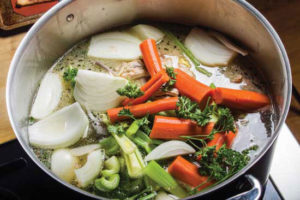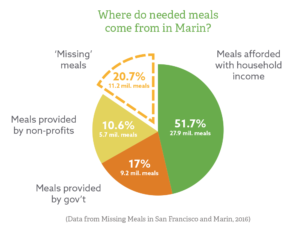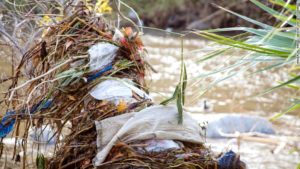Despite being one of the wealthiest counties in the nation, Marin County has a widespread population of people who are food insecure. Food insecurity is the state of living without reliable access to a sufficient quantity of affordable, nutritious food. Food insecurity is having to choose between impossible decisions like having the food you need or having shelter and a place to live.
There are nearly 50,000 people in Marin County who are food insecure, and worry about where their next meal is coming from. In Marin, over 16,000 seniors are food insecure. Many seniors have a difficult time getting access to fresh produce and affording nutritious foods. In a recent survey of 3,000 seniors, 46% report running out of money for food each month. On top of this, 3,500 seniors over 65 have annual incomes below the Federal Poverty Level of $11,670. These alarming and distressing facts demand change and require community effort to ensure that everyone in Marin has access to fresh, healthy, nutritious foods.
Marv Zauderer, founder of ExtraFood, came up with one solution. The United States has an extremely high rate of food waste, at a rate of over 40% (Zauderer). That means for every ten apples you buy, four of them go rotten! This rate of food waste is unacceptable, given the number of people in our local community who are food insecure on a daily basis. Zauderer founded ExtraFood because he witnessed how many people in this county were food insecure, and wanted to ease people’s worries about where their next meal was coming from. So much food was not being eaten and Zauderer realized how this “creates unnecessary waste and is bad for the environment.”
Zauderer decided to tackle the issue of food waste and food insecurity by creating a system to recover fresh healthy food that would normally go to waste and dona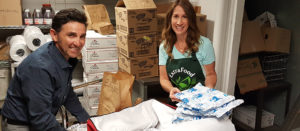 te it to someone in need. ExtraFood picks up excess fresh foods from organizations and businesses and delivers them immediately to various nonprofits that serve Marin’s population of hungry people. The foods that they deliver include fresh produce, prepared food, eggs, meat, dairy, packaged goods, and baked goods. According to Zauderer, “ExtraFood delivers food to more than 5,000 people per month to over 80 different sites around the county.” In three years of operation, ExtraFood has delivered over 900,000 pounds of food collected from over 150 donors to almost 83 different sites in Marin. This includes 13 new food programs they have started with their partners to expand the safety net further. ExtraFood has made 11,000 deliveries and continues to regularly supply food to Marin County. Zauderer explains that every donation counts, even the smallest contribution can make a difference.
te it to someone in need. ExtraFood picks up excess fresh foods from organizations and businesses and delivers them immediately to various nonprofits that serve Marin’s population of hungry people. The foods that they deliver include fresh produce, prepared food, eggs, meat, dairy, packaged goods, and baked goods. According to Zauderer, “ExtraFood delivers food to more than 5,000 people per month to over 80 different sites around the county.” In three years of operation, ExtraFood has delivered over 900,000 pounds of food collected from over 150 donors to almost 83 different sites in Marin. This includes 13 new food programs they have started with their partners to expand the safety net further. ExtraFood has made 11,000 deliveries and continues to regularly supply food to Marin County. Zauderer explains that every donation counts, even the smallest contribution can make a difference.
Another local organization working to take action against hunger in Marin is The Fairfax Food Pantry, co-founded by Holly Bragman. Bragman 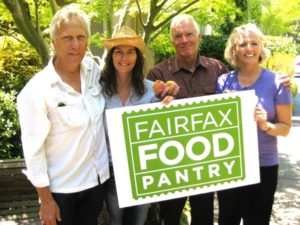 helped create The Fairfax Food Pantry in 2011 because she noticed that there was a need for this service in the Fairfax community: 25% of the participants of the San Geronimo Valley Community Center Food Pantry were from Fairfax. Bragman decided to open up the Food Pantry in Fairfax because transportation is often very difficult for people who are food insecure, and this new location would provide more central access to healthy nutritious foods. Located in the Fairfax Community Church, The Fairfax Food Pantry feeds over 130 families every week. According to Bragman, “the Pantry receives donations totaling 5,000 to 8,000 pounds of food per week.” These foods mainly include protein like meat, fresh veggies, fruit, and other staples for the everyday kitchen. If they have extra food at the end, they often give it to other locations or organizations like St. Vincent’s. Bragman’s vision is to act locally, helping the community through a system that includes Fairfax Volunteers, the Town of Fairfax, and the Fairfax Community Church to create an easy and accessible way for people to obtain healthy, fresh foods.
helped create The Fairfax Food Pantry in 2011 because she noticed that there was a need for this service in the Fairfax community: 25% of the participants of the San Geronimo Valley Community Center Food Pantry were from Fairfax. Bragman decided to open up the Food Pantry in Fairfax because transportation is often very difficult for people who are food insecure, and this new location would provide more central access to healthy nutritious foods. Located in the Fairfax Community Church, The Fairfax Food Pantry feeds over 130 families every week. According to Bragman, “the Pantry receives donations totaling 5,000 to 8,000 pounds of food per week.” These foods mainly include protein like meat, fresh veggies, fruit, and other staples for the everyday kitchen. If they have extra food at the end, they often give it to other locations or organizations like St. Vincent’s. Bragman’s vision is to act locally, helping the community through a system that includes Fairfax Volunteers, the Town of Fairfax, and the Fairfax Community Church to create an easy and accessible way for people to obtain healthy, fresh foods.
What can you do? You can support ExtraFood by committing to volunteer as a “food runner” and deliver healthy food to those in need. You can also help by encouraging other Marin businesses and organizations to donate their extra or leftover food. (For more information visit: ExtraFood.org) To support the Fairfax Food Pantry, you can donate money, sign up to volunteer, or something as simple as dropping off empty paper bags from 8:30-11:30 a.m. on Saturdays at the Fairfax Food Pantry. (For more information visit: FairfaxVolunteers.org)
Together we can help solve hunger in our local community by making small changes to our consumer behavior, and making a conscious effort to help those in need.
